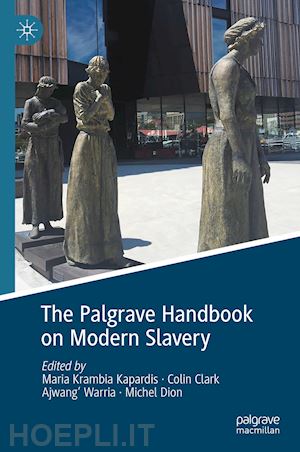
Questo prodotto usufruisce delle SPEDIZIONI GRATIS
selezionando l'opzione Corriere Veloce in fase di ordine.
Pagabile anche con Carta della cultura giovani e del merito, 18App Bonus Cultura e Carta del Docente
This handbook takes a comprehensive approach to studying and understanding modern slavery, particularly forced labour and human trafficking. It considers the historical and cultural roots of modern slavery and suggests that analyzing the issue from humanities, social sciences, criminological, and business perspectives could lead to a better understanding of its emergence worldwide. The handbook also highlights the role of religions/spiritualities and multinational corporations in the expansion of modern slavery and argues that exploring their potential ethical responsibilities is essential. Furthermore, it combines theoretical frameworks of intersectionality and globalization to study the interconnectedness of various factors in shaping and understanding modern slavery. Finally, it contains an impressive range of geographic and conceptual approaches to the problems of combating modern slavery.
PART I – HUMANITIES AND SOCIAL SCIENCES PERSPECTIVE.- 1. Modern Slavery’s Troubling History.- 2. Anthropological Frames: Human Trafficking as a Global Health Crisis.- 3. Grooming to violence: An analysis of pathways into exploitation and trafficking for female adult victims and survivors in South Africa.- 4. Human Trafficking Conceptualized Through Transnational and Domestic Contexts: A Social Scientific Exploration.- 5. Human Trafficking and Exploitation in Southeast Asia: Applying AsianCrit to Context, Policy, and Educational Possibilities.- 6. Epistemic Injustice: A New Form of Modern Slavery?.- 7. Working with survivors of modern-day slavery: Cross cultural competence and considerations for mental health service providers.- 8. Philosophical Perspectives to Modern Slavery.- 9. Innovations in fighting Slavery and Human Trafficking: Technology, Media and Collective Impact.- PART II - LEGAL AND CRIMINOLOGICAL PERSPECTIVE.- 10. Who is engaging in modern slavery offences?.- 11. Modernslavery prosecutions in England and Wales: A critical analysis.- 12. The unbearable lightness of modern sexual slavery. Legal and criminological framework in Spain.- 13. The Case of the Missing Victims of Modern Slavery: A comparison with domestic abuse.- 14. Modern Slavery and Perpetrators.- 15. Unfinished business: How the private sector is failing to protect children from sexual exploitation.- 16. Combating exploitation for organ removal and the failure of countries to include the “means” element in their domestic policies.- 17. Modern slavery as state-corporate harm.- PART III- BUSINESS PERSPECTIVE.- 18. Overcoming evil with good: The case of NGOs in combatting modern slavery.- 19. Modern Slavery Statements and UK Retail Supply Chains: Microfinance, poverty, and modern slavery in Cambodia.- 20. State of forced labor and gender violence and corporate irresponsibility during Covid.- 19: evidence from Bangladesh garment sector.- 21. Modern Slavery Disclosure Quality of the Largest ASX companies.- 22. Business Responses to Modern Slavery: A Comparative Analysis of the California.- Transparency in Supply Chains Act and the Australian Modern Slavery Act.- 23. Responsible Labor Practices in Palm Oil Industry in Southeast Asia: Assessing the Responsible Employment Charter of Malaysian Palm Oil Association.- 24. Management aspects of addressing modern slavery risk in corporate supply chains.- 25. Modern Slavery: The Hot Potato for Organisations, which Lacks Global Coordinated Action.- 26. Modern Slavery and Supply Chains.- 27. Business Responses to Modern Slavery: A Comparative Analysis of the California Transparency in Supply Chains Act and the Australian Modern Slavery Act.- 28. Discursive Tensions in Corporate Codes of Ethics and Modern Slavery Statements.
Maria Krambia Kapardis is Professor in Forensic Accounting, Department of Management, Entrepreneurship and Digital Business, Cyprus University of Technology, Cyprus
Colin Clark is Professor of Accounting in the Victoria University Business School, Australia.
Ajwang’ Warria is Associate Professor in the Faculty of Social Work at the University of Calgary, Canada.
Michel Dion is Adjunct Professor in the École de gestion at the Université de Sherbrooke, Canada











Il sito utilizza cookie ed altri strumenti di tracciamento che raccolgono informazioni dal dispositivo dell’utente. Oltre ai cookie tecnici ed analitici aggregati, strettamente necessari per il funzionamento di questo sito web, previo consenso dell’utente possono essere installati cookie di profilazione e marketing e cookie dei social media. Cliccando su “Accetto tutti i cookie” saranno attivate tutte le categorie di cookie. Per accettare solo deterninate categorie di cookie, cliccare invece su “Impostazioni cookie”. Chiudendo il banner o continuando a navigare saranno installati solo cookie tecnici. Per maggiori dettagli, consultare la Cookie Policy.